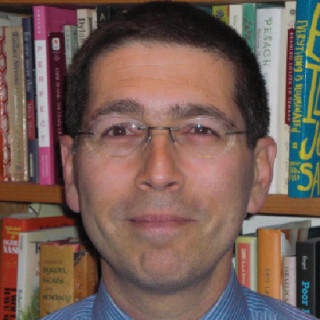In the geriatric wing of medicine, where I have found completeness and even joy for many years, death is no stranger. This has made me something of a fanatic for reading about the dead — not just my own patients but the physicians whose names, thanks to their eponymous diseases, we hear day in and day out. I find pleasure in learning something new and paying silent tribute to those curious enough to ‘discover’ a disease; I hope to catch a drop or two of inspiration. In addition, this research acts as a mirror that allows me to see how I am doing, and if I am by comparison measuring up. I read obits and other materials to explore the range of physicians that have preceded me and to imagine the kind of physician I would still like to be.
Throughout the course of my time researching late physicians, there are two in particular whose lives have struck me, for opposite reasons: the nefarious Dr. Hans Reiter, of Reiter’s Syndrome, and the humane Dr. John Epley, of the Epley Maneuver.
Dr. Reiter
I should state at the outset that I’ve never myself seen a case of Reiter’s Syndrome, but it used to come up on teaching rounds. Dr. Hans Conrad Julius Reiter was a German physician who identified in some of his patients a triad linking urethritis and conjunctivitis to an inflammatory arthritis. Moreover, he recognized that these symptoms followed an acute infection by 1-4 weeks and were a cross-reaction to antigens common both to the offending organism and to the body’s own tissue antigens. Fortunately, the medium and long-term prognosis is good — unlike what was later discovered about the person of Dr. Reiter.
Though an obit written after Reiter’s death in 1970 portrays Dr. Reiter as a highly accomplished and innovative physician — beyond his discovery of “Reiter’s syndrome,” he also cultured Treponema Pallidum, which led directly to the complement fixation tests for syphilis that resulted in the serologic tests we now know as the RPR and FTA — the full story is much more complex. For me, the art of researching a late physician includes a descent into the rabbit hole of references and links, and in this case, the additional texts that I found read more as horror than hagiography. From my research, I learned that Hans Reiter was a Nazi. In 1932, he took an oath of allegiance to Hitler.
According to an article written 30 years after the obit, Dr. Reiter was a passionate promoter of the 1930s eugenics movement who “sanctioned ‘medical experiments' that killed thousands of concentration camp prisoners.” The article also said that he was “included in a book of the top 5,000 Nazis” and participated in many murderous experiments at Buchenwald, injecting deadly microbes and overseeing the Nazi killing machine.
In reading up on Dr. Reiter, I am reminded that one can be an acclaimed thinker and teacher but also a terrible person. Thus it seems all the more important to read about others that preceded us. The obit can serve to delineate those on whose shoulders we stand and to denigrate those with whom we should never ethically rub shoulders.
Dr. Epley
Now here is the other side of the coin. Recently, I had success with a man suffering disabling vertigo whose prior visits to several practitioners left him demoralized and no better. He received, at last, the Epley Maneuver from a physical therapist trained in the technique, which involves sudden forced rotational movements. The Maneuver is grounded in Epley’s theory that vertigo is caused by particles, or otolith stones, that loosen over time in the inner ear and overstimulate nerves to the brain; the rotational movements appear to dislodge the otolith stones. Since he discovered it in 1980, the Epley Maneuver has helped tens of millions of benign paroxysmal positional vertigo patients across the globe.
As you can now tell is my modus operandi, I paused my workday to read an obituary about the eponymous Dr. Epley, an ENT surgeon who died in 2019. In the obit, I learned that Dr. John Epley became a fire-spotter while in medical school, spending his summers in fire towers that were part of the U.S. Forest Service: “John spotted fires, then raced down with his firefighting gear to fight them.” I also read that following medical school and a stint in the Air Force, Dr. Epley settled into a 40-year career of private ENT practice and ‘rocked’ the ENT world by putting forth the aforementioned “particle theory” of vertigo.
As inspiring as Dr. Epley’s medical achievements were to read about, what caught my eye in the obit was the insight into Dr. Epley’s profound humanity: “John was [patients’] advocate when they came to him with their lives in shambles and everyone around them, even family, thought there was nothing physically wrong with them. His contribution to medicine is as much about a paradigm shift of taking the dizzy patient seriously as it is about his medical discoveries. He was the ultimate patient advocate and a man of unusual compassion.” In reading Dr. Epley’s obituary, I received a reminder as to what kind of physician I want to be — competent, up to date, and innovative, but also a true ‘mensch’ (do-gooder).
***
Though some might say that in the urgencies and exigencies of daily life, there isn’t time to dwell on the lives of those who’ve gone before, I find the opposite is true. Reading about late physicians is something I’d recommend to all health care professionals: In becoming familiar with examples from medical history, we can map out the boundaries of what makes a good physician good, and a bad one bad. We can learn about mistakes to steer clear of, standards to which to aspire, choices to make and choices to avoid. The lives of those who’ve gone before offer a path that can guide us to goodness, often marked by guideposts, signs, warnings, and curves in the road. Rabbi Abraham Joshua Heschel advised his students to live their life as if it were a masterpiece. I would add, to live their life so that the physicians coming after you see the life as a masterpiece too.
Which physicians from history inspire your practice of medicine? Share in the comments!
Dr. Schor is a geriatrician specializing in long-term and post-acute care. He was medical director and attending physician at Daughters of Israel for close to 30 years and is now a Senior Medical Director at Optum Health. He is a new grandfather, an avid birder, and lives in Millburn, NJ. Dr. Schor is a 2022–2023 Doximity Op-Med Fellow.
Image by GoodStudio / Shutterstock






